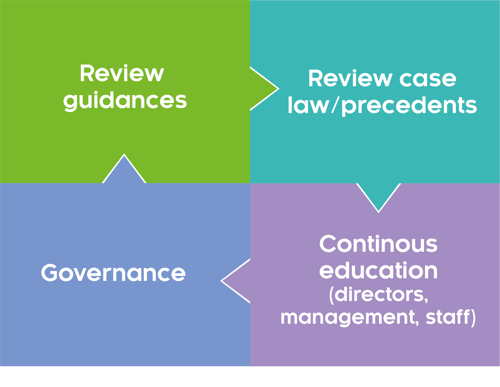Greenwashing needs no introduction. But while it’s not a new development, neither is it a fixed concept. Regulators are not taking a passive stance, having issued approximately $140,000 in greenwashing penalties within the funds management industry since 2022. This amount is set to rise into the tens of millions in the wake of several civil litigation cases where final approval on penalties remains outstanding.
For product issuers, the stakes are rising rapidly. Funds that have been subject to greenwash infringements or litigation now total more than $19 billion in assets under management (AUM) at the time of each case. Size is clearly not a factor, given that individual fund AUM has ranged from funds with $14 billion in assets to one with less than $1 million. The regulator has stated more is to come. So, what should issuers do to minimise the risk of getting claims wrong?
Lessons learned from Greenwash cases
In 2023, we examined the concepts of greenwash, particularly the implications of its many forms:

Prior to the release of ASIC’s guidance on avoiding greenwash in mid-2022 (ASIC INFO 271), any regulatory or litigation actions were typically centred around a broader lack of market disclosures or failure to provide information such as climate change business risks.
Since the release of INFO 271, product issuers have logically placed it at the centre of their efforts to avoid infringement. However, even the best guidances remain subject to “interpretation failure” by users. Most greenwash cases to date have been centred around insufficient disclosures regarding negative screening, or in some cases overstating green outcomes.
Recent civil litigation outcomes in greenwashing cases are transforming the landscape. Although guidelines provide direction, a growing collection of case law adds complexity as regulators and courts try to apply existing laws to swiftly changing problems.
The significance of the Active Super case
The Federal Court case involving Active Super should serve as a warning for fund managers universally. The core components of the case are not unprecedented. In short, if you make unequivocal statements, ASIC and the courts are going to hold you to them. A complicating factor arising from the case is the idea of the "reasonable person" test. This concept has been a long-standing element across different legal domains, basically holding that a responsible individual is expected to demonstrate "reasonable judgement and skill" when making decisions.
This is not in conflict with ASIC’s guidelines, which focus more on emphasising that claims must be founded on reasonable grounds. However, issuers must be careful to avoid falling into an expectation gap between themselves and consumers.
Why is this important? Broadly, Active Super had stated it would not make or hold investment in companies deriving revenue (based on certain thresholds) from select controversial industries, including gambling, oil tar sands, and coal mining. The Court determined that for several of the issues raised, the crux of the matter was not just the disclosure specifics, but how a reasonable person would interpret them. Effectively, the Court made several conclusions, including that:
- A reasonable person wouldn’t read the terms of an investment policy as being contrary to other claims being made, which were considered unequivocal in nature.
- A reasonable person wouldn’t understand the distinction between directly holding shares in a company versus holding indirect exposures through another fund.
- A reasonable person would understand ‘gambling’ to include lottery tickets.
Clearly, issuers cannot merely rely on technicalities and evidence to support reasonable grounds. They must also consider whether the information will be understood by a reasonable person.
Introducing “greenruling”
When assessing the different forms of greenwash listed above, it’s entirely possible we can now add another form: “Greenruling” - placing too much reliance on rules and technicalities in disclosures, not what a realistic explanation should be. The courts have clearly signalled little patience for a rigid interpretation of what particular words mean to adhere strictly to the literal meaning of specific terms. It is vital for issuers to cautiously tread the line between what is considered reasonable grounds and how a reasonable individual would interpret those.
A four-part approach to mitigating greenwash risk
How should this be approached? We think taking a four-part approach can help. Firstly, issuers should still actively review standards and guidelines, as these will be foundational. Secondly, you need to review not just any precedents arrived at by the regulator in infringement cases, but also case law that emerges from the courts. Thirdly, you need a comprehensive education program that upskills boards, senior management and employees on the fundamentals and risks of greenwashing. And fourthly, you need a robust governance framework to oversee the whole system. Embedding relevant criteria into existing risk management procedures and controls should be considered essential, along with the addition of any other bespoke policies that are fit for purpose to an issuer’s needs.

Source: Zenith Investment Partners
The importance of clarity in claims
Zenith sees the Active Super case as a critical learning opportunity for the industry. Greenwashing, and the Court’s responses to it, are not simple. They’ll be fluid and dynamic, not pedantically tied to industry standards and guidances.
In 2023, we suggested six questions to test claims for greenwash:
- Is a claim transparent, accurate and clear to ensure an informed choice?
- Is there current, credible evidence to support the claim?
- Does it tell the entirety of the story without obscuring the other parts of the overall impact?
- Is the claim unconditional, or does it contain partially correct or incorrect aspects or apply conditions? If there are caveats, are they transparent?
- If comparisons are used, is their basis fair, accurate, and clear?
- Are claims simple enough to be understood and assessed?
Clearly, in light of recent events, it’s the question of simplicity that’s easy to misjudge. We all recognise that claims must be supported by reasonable grounds, and reasonable grounds must be supported by evidence. But we also need to recognise that while evidence is part of the solution, it must not be at the expense of understanding.



